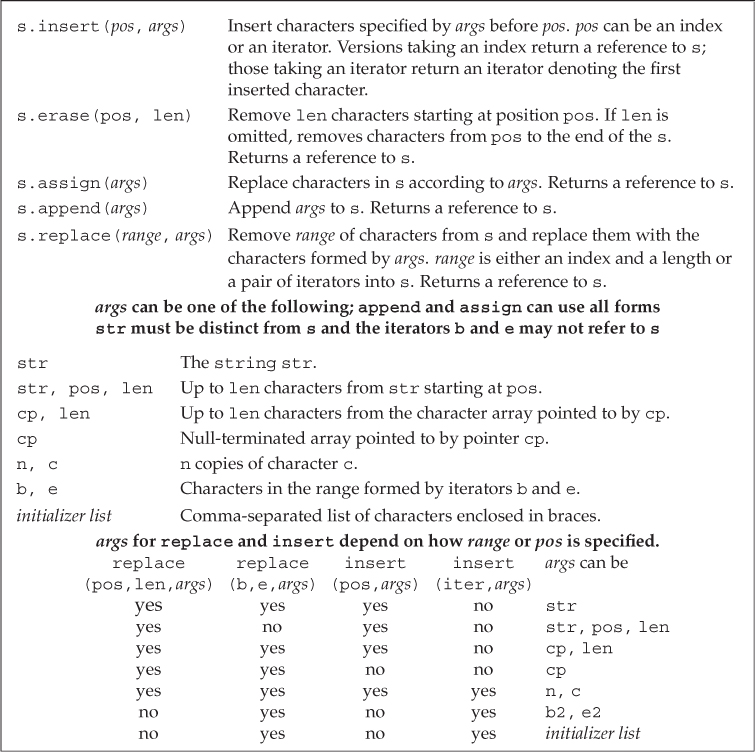9.5.2. Other Ways to Change a string
The string type supports the sequential container assignment operators and the assign, insert, and erase operations (§ 9.2.5, p. 337, § 9.3.1, p. 342, and § 9.3.3, p. 348). It also defines additional versions of insert and erase.
In addition to the versions of insert and erase that take iterators, string provides versions that take an index. The index indicates the starting element to erase or the position before which to insert the given values:
s.insert(s.size(), 5, '!'), // insert five exclamation points at the end of s
s.erase(s.size() - 5, 5); // erase the last five characters from s
The string library also provides versions of insert and assign that take C-style character arrays. For example, we can use a null-terminated character array as the value to insert or assign into a string:
const char *cp = "Stately, plump Buck";
s.assign(cp, 7); // s == "Stately"
s.insert(s.size(), cp + 7); // s == "Stately, plump Buck"
Here we first replace the contents of s by calling assign. The characters we assign into s are the seven characters starting with the one pointed to by cp. The number of characters we request must be less than or equal to the number of characters (excluding the null terminator) in the array to which cp points.
When we call insert on s, we say that we want to insert the characters before the (nonexistent) element at s[size()]. In this case, we copy characters starting seven characters past cp up to the terminating null.
We can also specify the characters to insert or assign as coming from another string or substring thereof:
string s = "some string", s2 = "some other string";
s.insert(0, s2); // insert a copy of s2 before position 0 in s
// insert s2.size() characters from s2 starting at s2[0] before s[0]
s.insert(0, s2, 0, s2.size());
The append and replace Functions
The string class defines two additional members, append and replace, that can change the contents of a string. Table 9.13 summarizes these functions. The append operation is a shorthand way of inserting at the end:
string s("C++ Primer"), s2 = s; // initialize s and s2 to "C++ Primer"
s.insert(s.size(), " 4th Ed."); // s == "C++ Primer 4th Ed."
s2.append(" 4th Ed."); // equivalent: appends " 4th Ed." to s2; s == s2
Table 9.13. Operations to Modify strings

The replace operations are a shorthand way of calling erase and insert:
// equivalent way to replace "4th" by "5th"
s.erase(11, 3); // s == "C++ Primer Ed."
s.insert(11, "5th"); // s == "C++ Primer 5th Ed."
// starting at position 11, erase three characters and then insert "5th"
s2.replace(11, 3, "5th"); // equivalent: s == s2
In the call to replace, the text we inserted happens to be the same size as the text we removed. We can insert a larger or smaller string:
s.replace(11, 3, "Fifth"); // s == "C++ Primer Fifth Ed."
In this call we remove three characters but insert five in their place.
The Many Overloaded Ways to Change a string
The append, assign, insert, and replace functions listed Table 9.13 have several overloaded versions. The arguments to these functions vary as to how we specify what characters to add and what part of the string to change. Fortunately, these functions share a common interface.
The assign and append functions have no need to specify what part of the string is changed: assign always replaces the entire contents of the string and append always adds to the end of the string.
The replace functions provide two ways to specify the range of characters to remove. We can specify that range by a position and a length, or with an iterator range. The insert functions give us two ways to specify the insertion point: with either an index or an iterator. In each case, the new element(s) are inserted in front of the given index or iterator.
There are several ways to specify the characters to add to the string. The new characters can be taken from another string, from a character pointer, from a brace-enclosed list of characters, or as a character and a count. When the characters come from a string or a character pointer, we can pass additional arguments to control whether we copy some or all of the characters from the argument.
Not every function supports every version of these arguments. For example, there is no version of insert that takes an index and an initializer list. Similarly, if we want to specify the insertion point using an iterator, then we cannot pass a character pointer as the source for the new characters.
Exercises Section 9.5.2
Exercise 9.43: Write a function that takes three strings, s, oldVal, and newVal. Using iterators, and the insert and erase functions replace all instances of oldVal that appear in s by newVal. Test your function by using it to replace common abbreviations, such as “tho” by “though” and “thru” by “through”.
Exercise 9.44: Rewrite the previous function using an index and replace.
Exercise 9.45: Write a funtion that takes a string representing a name and two other strings representing a prefix, such as “Mr.” or “Ms.” and a suffix, such as “Jr.” or “III”. Using iterators and the insert and append functions, generate and return a new string with the suffix and prefix added to the given name.
Exercise 9.46: Rewrite the previous exercise using a position and length to manage the strings. This time use only the insert function.
